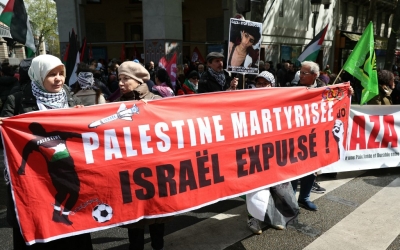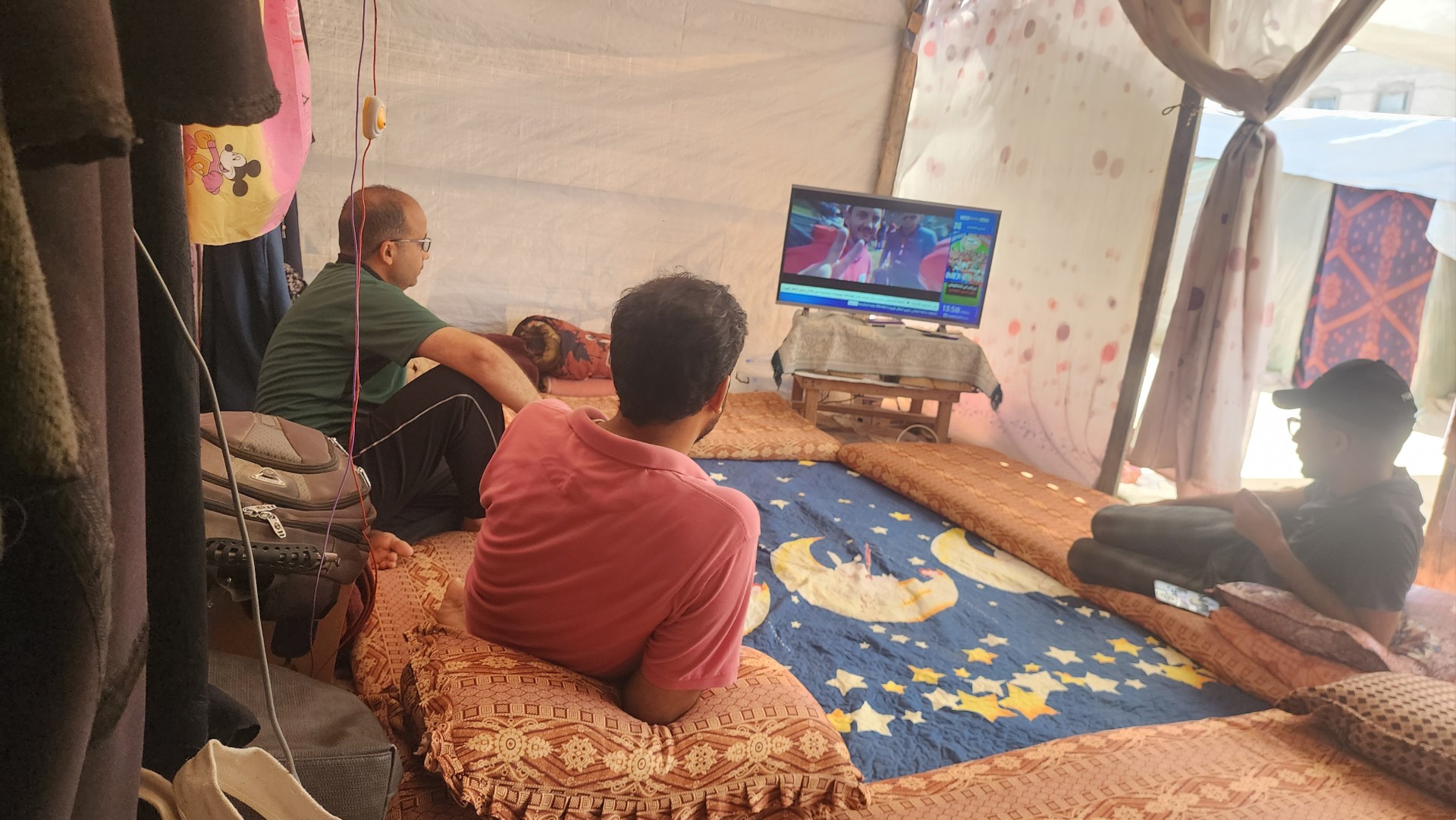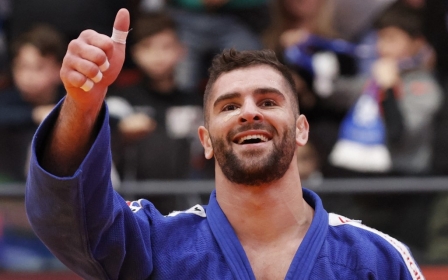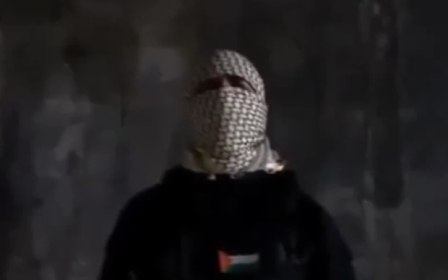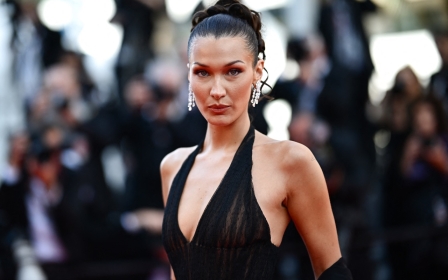Paris 2024: Olympics begins under shadow of Israeli obliteration of Palestinian sport
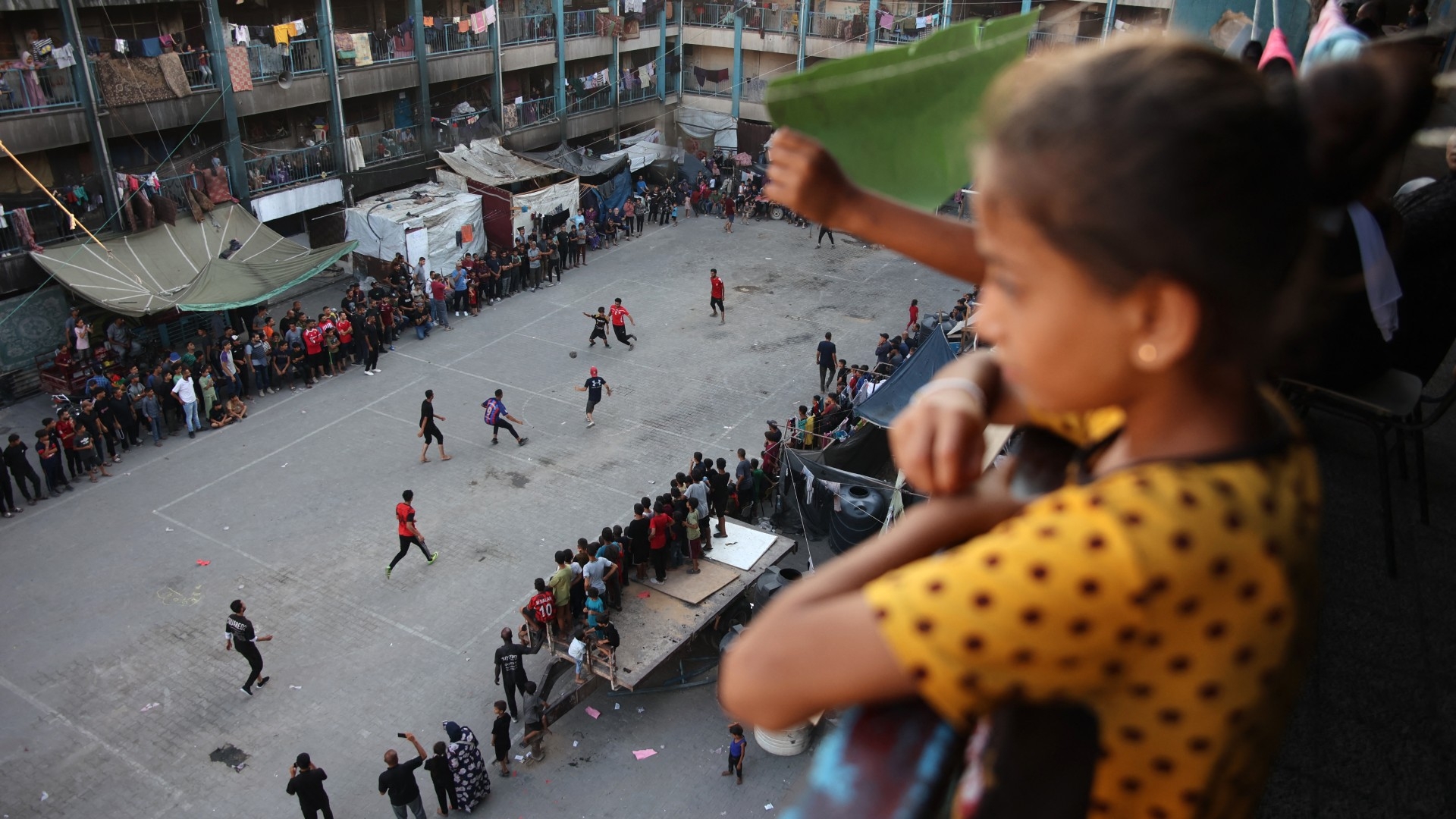
Al-Salah Club in Deir al-Balah is one of very few sporting facilities in Gaza still standing.
“The club is now a sanctuary… displaced people come to take shelter inside it,” Sobhi Mabrook, the second tier football club’s coach, tells Middle East Eye.
“We thought of resuming sports activities, but we couldn’t. It’s unfeasible. This is a symptom of Israel’s war on Gaza, particularly on sports.”
Al-Salah, once a training facility for hundreds of athletes, was an incubator of different sports, including judo, karate, handball and wrestling. But all that changed when Israel’s onslaught on Gaza began on 7 October.
Israeli bombs have killed many of the club’s talented stars.
New MEE newsletter: Jerusalem Dispatch
Sign up to get the latest insights and analysis on Israel-Palestine, alongside Turkey Unpacked and other MEE newsletters
For those still alive, Israeli targeting of sports facilities and deliberate starvation tactics have left them unfit and feeling weak.
For club coach Mabrook, a former football star himself, the Olympic Games in Paris begins on Friday under the dark shadow of violent Israeli crimes.
“We will see Palestinian Olympians next week. I hope we will be able to see and celebrate their triumphs,” he said, referring to eight athletes who will represent Palestine at the Games.
“But unfortunately, not all do get the chance. We are occupied and marginalised. This is the undeniable reality of life in Gaza.”
Israel violates ancient 'Olympic Truce'
Around 350 Palestinian athletes have been killed by Israeli forces over the past 10 months, according to Palestine’s Olympic Committee.
The Palestinian body wrote to the International Olympic Committee (IOC) this week, calling for Israel to be banned from the Games over its war on Gaza.
It adds to efforts by the Palestinian Football Association to get Israel thrown out of Fifa, too.
“We have submitted all the evidence to the IOC and Fifa to ban Israeli athletes,” Nader al-Jayooshi, deputy secretary-general of the Palestine Olympic Committee, told MEE.
That evidence includes details about Israel breaking an ancient Olympic Truce, just hours after it commenced on 19 July.
The Olympic Truce, which dates back to ancient Greece in the eighth century BCE, calls for a halt to fighting ahead of the Games.
'We are occupied and marginalised. This is the undeniable reality of life in Gaza'
- Sobhi Mabrook, sports coach
Jayooshi said that Israel had breached international law, as well as the IOC and Fifa’s statutes.
He pointed at examples of Israeli athletes competing at this week’s Olympics either having served in, or expressed public support of, Israel’s military.
“Despite all [the evidence] submitted to both committees, we unfortunately received no positive response. This is absolutely unacceptable,” he said.
The IOC reiterated this week its rejection of calls for Israel to be suspended.
It has been accused of double standards, after banning Russia and Belarus from the Games over the war in Ukraine. Russian and Belarussian athletes can only take part as neutrals, without flags or anthems being played.
Mirna Mehdi, a 17-year-old sports enthusiast in Gaza, believes that human rights are being applied selectively.
“Russia was banned… and then Israel [is] committing genocide and escapes a ban,” Mehdi told MEE.
“It looks like we’re living in a different world where human rights apply for specific categories," she added, tearfully.
'I lost my dreams, my teammates, everything'
Israel’s killing of Palestinian athletes began in the first few days of the war, when footballer Nazir al-Nashnash was killed by an Israeli missile in northern Gaza.
In November, Ibrahim Qusaya and Hassan Zuaiter, two members of Palestine’s national volleyball team, were killed by an Israeli air strike on Jabalia refugee camp.
A month later, Bilal Abu Samaan, coach of the national athletics team, was killed in an Israeli air raid.
'Almost all sporting facilities have been obliterated. We need more than 10 years to resume'
- Nader al-Jayooshi, Palestine Olympic Committee
Muhammad Barakat, who played for Palestine’s national football team, was killed by an Israeli air strike in southern Gaza in March. He was known locally as “the legend of Khan Younis”.
Distance runner Majed Abu Maraheel, Palestine’s first ever Olympian and flag bearer during the 1996 Games in Atlanta, died in June from kidney failure due to power outages and medical shortages caused by Israel’s war and siege.
For Naji al-Nahal, one of Gaza’s finest and most decorated footballers, the last few months have been about queueing up for water and food, and mourning the killings of his coaches and fellow athletes. He hasn’t kicked a ball since 7 October.
“I lost my passion, my dreams, my teammates, and my house… everything,” he told MEE.
“This is the story of thousands of players. I had many opportunities abroad to play and revive my career. However, the situation is unbearable. I couldn't even pay the coordination fees.”
He said that Fifa and the IOC’s stances on the war were “disgraceful”.
“Israel destroyed everything related to sports in Gaza, including clubs and stadiums,” said Nahal.
Jayooshi reiterated that point, stating that Israel’s war on Gaza meant that no one from the enclave would be able to participate in the Olympics.
“The future of sports in Gaza seems completely uncertain, as almost all sporting facilities have been obliterated. We need more than 10 years to resume sporting activities in the Strip,” he said.
According to Palestine's FA, at least 50 sports facilities and stadiums have been destroyed in the enclave, including Yarmouk, Palestine, Beit Hanoun, Rafah, Nuseirat, and Khan Younis Municipal stadiums.
The sports facilities still standing are in Deir al-Balah in central Gaza, and include the Khadamat Deir al-Balah, Ittihad Deir al-Balah and Al-Salah clubs, as well as Mohammed Al-Durrah stadium.
Last December, Yarmouk Stadium in Gaza City was even used by Israeli forces to detain, strip and torture Palestinians.
'We will not give up'
Jayooshi said that despite everything, “our athletes are very eager and determined to do their best in the Olympics and overcome all difficulties, because we have a message to convey and an identity to maintain”.
The eight Palestinian athletes participating in the coming days will compete in taekwondo, athletics, swimming, boxing, judo and skeet shooting.
“I don’t know how I can watch the Games,” said footballer Nahal. “I really want to see our athletes, but the circumstances don’t help us. I just wish them all the best.”
Sports fan Mehdi said she was looking forward to watching and supporting Palestinian athletes.
“The Olympics is a chance to tell the world more about our struggles and suffering during this genocide. Those participating athletes are our voice,” she said. “Whatever the result is, it will make us proud.”
Jayooshi reiterated that Palestine will persevere, irrespective of all the pain and injustices.
“In the end, we will not give up. We’ll continue despite all the wounds in our hearts. We deserve a life and a good future like any other humans around the world.”
Middle East Eye delivers independent and unrivalled coverage and analysis of the Middle East, North Africa and beyond. To learn more about republishing this content and the associated fees, please fill out this form. More about MEE can be found here.


